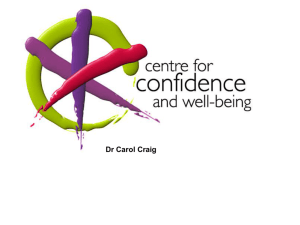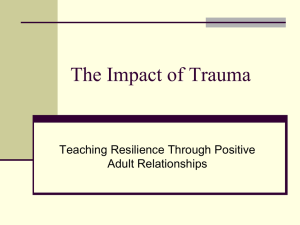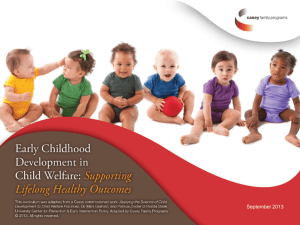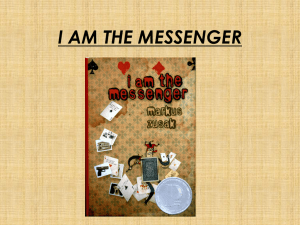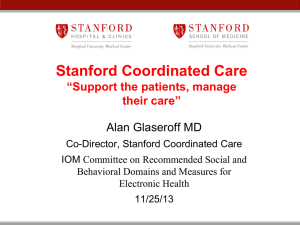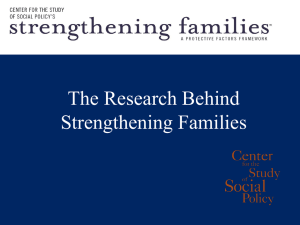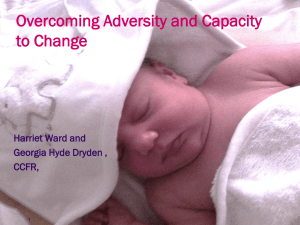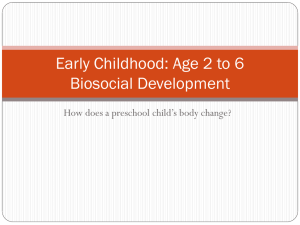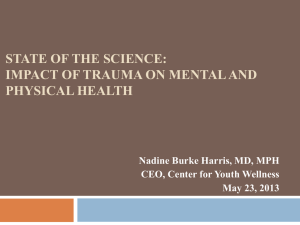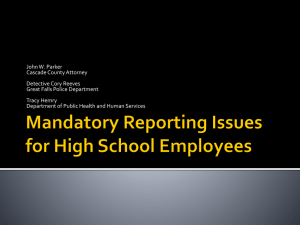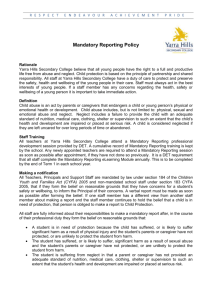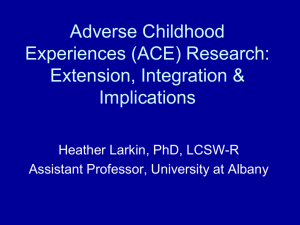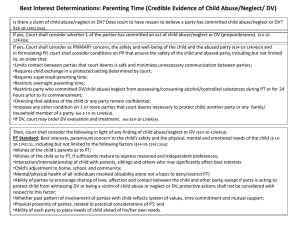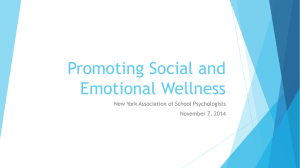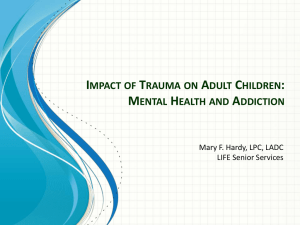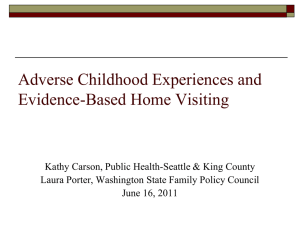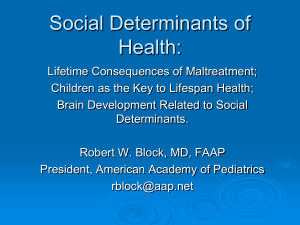presentation by kate thompson and marian robertson
advertisement
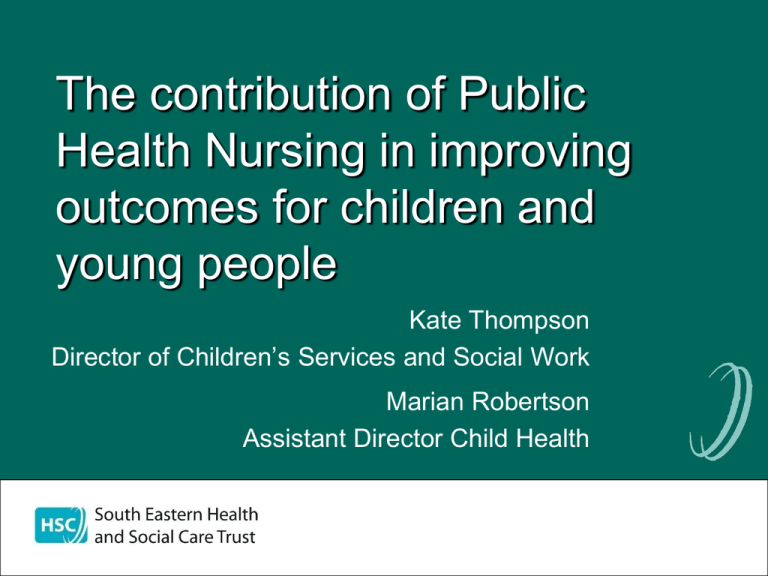
The contribution of Public Health Nursing in improving outcomes for children and young people Kate Thompson Director of Children’s Services and Social Work Marian Robertson Assistant Director Child Health Marian Robertson Children’s Outcomes Board Old Warren Partnership West Winds Association Downpatrick Partnership Kilcooley Partnership Colin Partnership Outcomes Board Accountability Trust Board Steering Children’s Director (Chair) and 4 ADs, 3 Voluntary reps, 5 Community Networks Looked After Children Delivery Group Mental Wellbeing Delivery Group Parenting / Early Years Delivery Group Disability Group Delivery Locality Approach • Building health and wellbeing capacity with community groups at a local level (often within a specific estate) • Working from the ground-up to identify health and wellbeing needs • Supporting communities in taking ownership for their own health and wellbeing • Helping with a local health planning process owned by the community • Relationships and trust are vital • Health Improvement Plans being developed with groups representing deprived communities within Lisburn and Ards • Trying to determine performance indicators to understand improvement • Need to understand health in its broader context while not being sidetracked • It takes time to build up trust and rapport Children’s: Children’s Outcomes Board • Looked After Children • Vulnerable Young People • Children with Complex Needs • Family Support • Emotional Wellbeing “In my beginning is my end” T S Eliot, four Quartets Pathways to crime often laid down by age 3 Dunedin study from 1973, New Zealand: • ‘At risk’ male group identified at 3 by nurses, 2.5 X more likely to offend and offences much more serious – (e.g. robbery, rape, homicide) – 47% of group abused partners • Fewer females conduct disordered, but for those who were: – 30% of ‘at risk’ group had teenage births (vs. 0%) – 43% were in violent, abusive relationships “Immature mothers, with no strong parenting skills and violent partners have already borne the next generation of ‘at risk’ children” Understanding the infant brain Californian ACE Study • Center for Disease Control and Prevention & Kaiser Permanente • One of largest investigations ever on links between childhood maltreatment and later-life health and well-being • 17,000 members at comprehensive physical examinations provided detailed information on childhood abuse, neglect and family dysfunction ACE Studies Adverse Childhood Experiences (ACE) Study • • • • • • • • Emotional abuse Physical abuse Sexual abuse Physical neglect Emotional neglect Alcoholic in household Drug user in household Witnessed domestic violence Californian ACE Study Likelihood of Heart Disease with single ACEs: 1.3 x by Emotional Neglect 1.3 x by Substance Abuse 1.4 x by Physical Neglect 1.4 x by Domestic Violence 1.4 x by Sexual Abuse 1.5 x by Physical Abuse 1.7 x by Emotional Abuse Californian ACE Study Health risks which increase with ACEs • • • • • • • liver disease (x 2) chronic obstructive pulmonary disease (COPD) (x 3) adult smoking (x 3) serious job problems (x 3) absenteeism from work (x 4) alcoholism and alcohol abuse (x 6) suicide attempts (x 14) Californian ACE Study Health risks which increase with 4 ACEs • • • • • • depression (x 3) intercourse by 15 (x 4) teenage pregnancy (x 2) more than 50 sexual partners (x 3) sexually transmitted diseases (STDs) intravenous drug use (x 11) ACE (Adverse Childhood Experiences) • CONSEQUENCES FOR SOCIETY Higher levels of Violence Higher Levels of Anti-social behaviour Greater adult mental health problems Increased school under-performance (lower IQs) Economic under-performance Poor personal relationships Poor physical health, high health expenditure Lower tax income and less wealth creation Reduced societal happiness • …and higher expenditure on social welfare, criminal justice, prisons, police etc Implication for optimum investment Source: J Heckman & D Masterov (2005) Ch 6, New Wealth for Old Nations: Scotland’s Economic Prospects Early Prevention works • MacLeod and Nelson studied 56 programmes designed to promote family wellness and prevent child maltreatment • Most interventions are successful • The earlier the intervention the better • Prevention (proactive) had greater effect at follow-up • Reactive interventions tend to fade over time, relapse common • However, – Support needs to be targeted at specific families most in need – Public Health Nurses need to work in an integrated way with a wide range of providers – This leads to the ‘targeted support’ approach Targeted Support Approach • Health Visitors, Midwifes and Social Workers all have an unparalleled view as to which specific families have the greatest emotional need at the earliest stages. • Excellent community and voluntary groups are working with at risk families and individuals but can struggle to target the most in need in a co-ordinated manner • Projects managed by the Children’s Outcomes Board as integrated initiatives New Parent Support Programme • Designed for vulnerable mothers during the antenatal and post natal phase • Referrals from initial assessment by midwife • Health Visitor visits the parent/s to be and undertakes an informal education process • Empowerment approach where engagement and esteem are key • Solihull approach provides the theoretical underpinnings Conclusion • The New Parent Programme has been developed not only to improve attachment between a vulnerable mother and her baby but also to: – Make the largest return possible in relation to tackling health inequalities – Deliver significant wider societal benefits over the long term, which can be quantified
